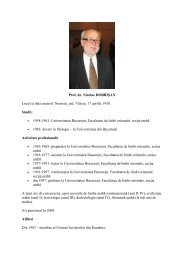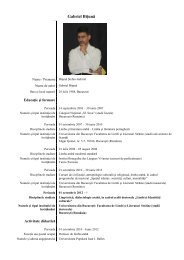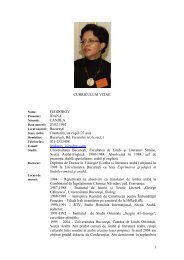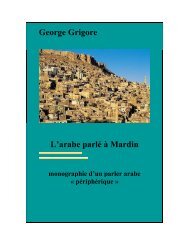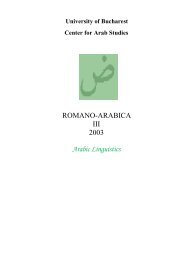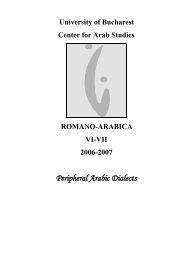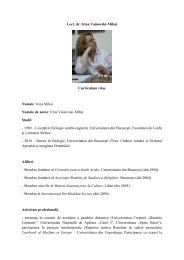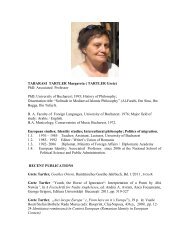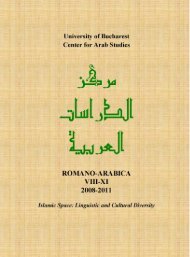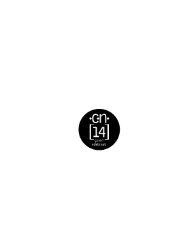12 55 Years of Arab Studies in Romania - Secţia de Arabă
12 55 Years of Arab Studies in Romania - Secţia de Arabă
12 55 Years of Arab Studies in Romania - Secţia de Arabă
Create successful ePaper yourself
Turn your PDF publications into a flip-book with our unique Google optimized e-Paper software.
Dictionnaire arabe français by A. L. <strong>de</strong> Prémare (from here onwards abridged as<br />
DAF) 5 and A dictionary <strong>of</strong> Moroccan <strong>Arab</strong>ic: Moroccan English by R. S. Harrell<br />
(abridged as ME). DAF is the most comprehensive dictionary <strong>of</strong> Moroccan <strong>Arab</strong>ic<br />
dialects and is, on the whole, comprised <strong>of</strong> entries collected over <strong>de</strong>ca<strong>de</strong>s by the<br />
French dialectologist Georges Séraph<strong>in</strong> Col<strong>in</strong>. ME conta<strong>in</strong>s data gathered <strong>in</strong> the<br />
sixties <strong>of</strong> the last century by the American dialectologist Richard Sla<strong>de</strong> Harrell<br />
and is based on the speech <strong>of</strong> educated Moroccans from the cities <strong>of</strong> Casablanca,<br />
Rabat and Fez. Occasionally, other less comprehensive dictionaries or glossaries<br />
are as well cited <strong>in</strong> my article.<br />
Certa<strong>in</strong>ly, not all the verbs reflect<strong>in</strong>g ancient forms IV are now equally as<br />
common <strong>in</strong> Morocco; some <strong>of</strong> them occur only <strong>in</strong> a s<strong>in</strong>gle dialect. For more<br />
<strong>de</strong>tails regard<strong>in</strong>g the geographic distribution <strong>of</strong> a verb, the rea<strong>de</strong>r can access the<br />
DAF.<br />
For practical reasons verbs are divi<strong>de</strong>d <strong>in</strong>to two different groups. The first<br />
group is comprised <strong>of</strong> those whose causative/factitive mean<strong>in</strong>g clearly <strong>in</strong>dicate<br />
their orig<strong>in</strong> from a former form IV.<br />
The second group is exclusively comprised <strong>of</strong> verb doublets reflect<strong>in</strong>g<br />
ancient forms I and IV and, for this reason, show semantic as well as<br />
morphological opposition (respectively a/u ≠ –i and ū ≠ ī <strong>in</strong> the imperfective <strong>of</strong><br />
<strong>de</strong>fective and hollow verbs).<br />
Verbal roots are <strong>in</strong> this study arranged accord<strong>in</strong>g to the <strong>Arab</strong>ic alphabet.<br />
Group 1.<br />
gza (yĭgzi)/dza (yĭdzi) “to suffice” 6 < ʔağzā (yuğzī) “to suffice, to replace”.<br />
h}s}a (yăh}s}i) “to count, to enumerate” 7 < ʔ h}s}ā (yuh}s}ī) “to count”.<br />
h}āt} (yh}īt}) “to close <strong>in</strong> from all si<strong>de</strong>s, to encircle” 8 < ʔah}āt}a (yuh}īt}u) “to enclose, to<br />
encircle”.<br />
xbər} (yəxbər}): “to tell, to <strong>in</strong>form, to let know” 9 < ʔaxbara (yuxbiru) “” the I stem<br />
xabara means “to try, text, to have experienced”.<br />
5 In spite <strong>of</strong> its title, it is a dictionary <strong>of</strong> Moroccan <strong>Arab</strong>ic.<br />
6 DAF 2: 187-189 (wāh}əd lə-qd}ər} lli yĭdzīni “une somme d’argent qui suffise à ma subsistance”).<br />
Verb not quoted by ME.<br />
7 DAF 3: 140; ME 248 (h}s}a băʕda lə-ġnəm “he’s already counted the sheep”); DAM 78.<br />
8 DAF 3: 273-274 (h}āt}ət b-əl-ʕădyān nāqma “une catastrophe a entouré les ennemis <strong>de</strong> tous<br />
côtés”); not quoted by ME and DAM.<br />
9 ME 213 (xbər}thŭm bīn b}b}āhŭm ža “I <strong>in</strong>formed them that their father has arrived”, xbər}ni fuq-āš<br />
gād yži “let me know when he’s com<strong>in</strong>g”); DAM 159 (xəbr}u b-lli ġədda l-ʕīd “le <strong>in</strong>formaron <strong>de</strong><br />
que mañana es la fiesta <strong>de</strong>l cor<strong>de</strong>ro”).<br />
8



